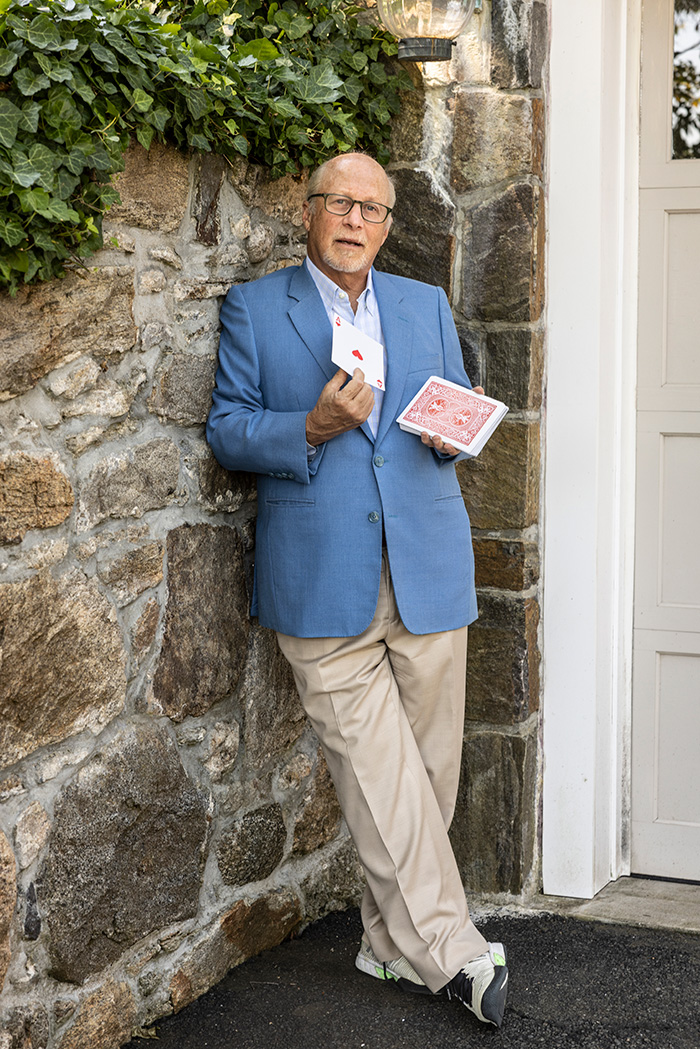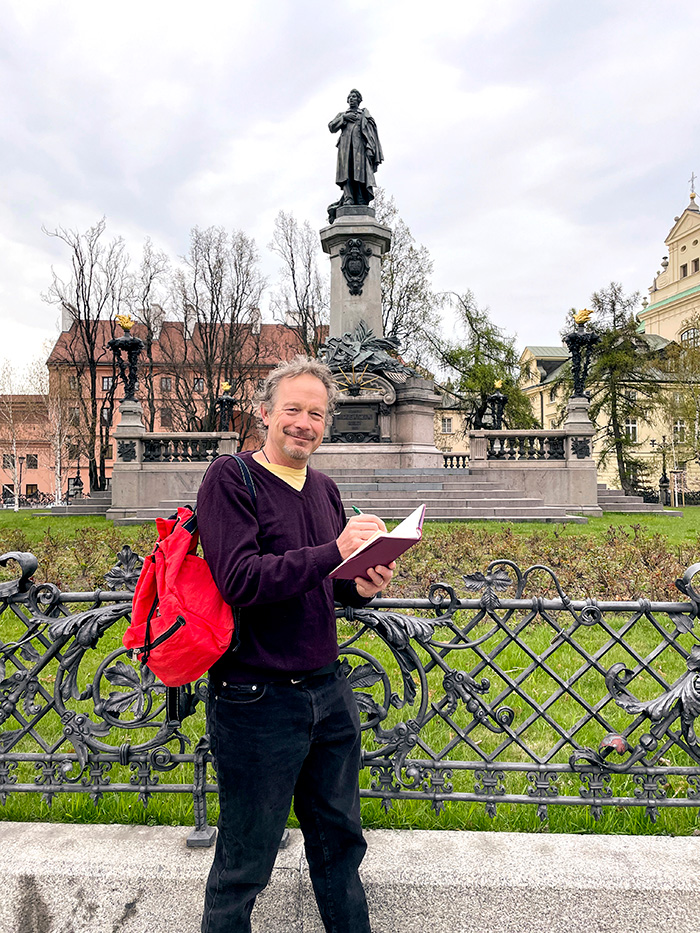We were seeing these children in a particular context: fun. That was why the Herzes had come, after all—to spread some laughter around. But you could see cracks in the hilarity. It might be a child who sat amid the merriment silently swaying, or a mother with a far-off gaze. A grade-school teacher in a town outside Warsaw described a clear difference between children who left Ukraine early in the war and those who left later. The later ones, she said, had trouble focusing or even talking. Touch one on the shoulder and he might flinch.
Nearly all Ukrainian men were required to remain in the country to assist in the war effort, and the family ruptures had been sudden and jarring. “Our kids have mothers only,” a young English teacher named Dasha told me at Junior Space School. “No fathers here.” Her own 11-year-old brother, Alex, was one of the students, and when I asked him what he liked to do for fun, he avidly declaimed, “My hobby is to watch cartoons! I also like tennis!” With a big grin, he mimicked a two-hand backhand. When he wandered off, Dasha spoke in a lower voice: “My brother and I are here alone—our parents are still in Odesa. Here in school, the children are excited, but at night we talk to my mother on the phone and Alex cries a lot. He wants to go home.”
Mariupol, Odesa, Kharkiv: once mere names in the headlines, these places now evoked harrowing stories of survival. A mother from Dymer, near the Belarus border, told us of helicopters firing daily on the town, rockets flying “from morning to night” and the streets on fire. Another woman recalled the outbreak of war in Kharkiv. She and her family hauled mattresses, water bottles and food to the basement and hid there for two weeks as bombs rained down and she told her 4-year-old son that the city was being attacked “by a bad man with fireworks.” She described a paralyzing fear—fear so bad it froze you “like a wax figure.”
We were seeing these children in a particular context: fun. But you could see cracks in the hilarity.
Other stories were heartrending. In Łódź, where Bill and Dana performed at an orphanage sheltering 40 Ukrainian kids, we met Tatiana, a 25-year-old social worker who escaped eastern Ukraine along with many of the children. In halting English, she recounted how in 2014 the Russians briefly captured her hometown. She’d been 17 then, and in school, when tanks banged through the streets. “After a few days, Ukrainians push them out. But now they try again.” When the current fighting began, she had fled with her mother and brother. And her father?
“He is not here,” she said quietly. “He went a different way.” Her blue eyes radiated intensity. “He believed the propaganda. Now he is with the Russians.”
It was hard to fathom how brutally divisive the war is. After the orphanage show in Łódź, the Herzes listened in as our interpreter, Anya, spoke with Tatiana. Anya, who worked as a freelance web designer and had fled Kyiv when war broke out, had had a Russian boyfriend in high school who subsequently moved to St. Petersburg to begin a career as a dentist. They’d stayed in touch, and when the war began, she sent him stories about Russian misdeeds—including accounts of children being killed. He rebuffed her, and they broke off contact.
“Putin has lost his mind,” Anya said now. “And now he convinces Russians of propaganda, so they lose their mind too.”
Gwenn Herz mentioned reading about how people in Russia believed that anyone daring to speak Russian in Ukraine risked being beaten or even killed.
“This is absurd!” Anya said heatedly. “Tatiana and I, we spoke Russian in our families. We spoke Russian at school. We still speak it!”
Would that change? Bill asked. Would Ukrainians abandon the language?
Both women nodded. “It will change,” Tatiana said. “It is already beginning.”
Anya had spoken about going to Russian schools all her life, reading Dostoevsky, Gogol and, above all, Tolstoy. It was sobering to contemplate the fiendishness of an aggression that had divided Ukrainians not only geographically but within families and even within themselves—separating them from the language of their childhood, so that a 20-year-old who sighed over Anna Karenina now found it tainted. It was the ultimate divide-and-conquer.
Before one show in Warsaw, an organizer cautioned me not to use any last names in anything I wrote or specify the building where the refugees were staying: So rife was fear of Russian perfidy, in this age of digital monitoring, that even magic shows were enwrapped in secrecy. Rumor, conspiracy theory and propaganda, fed by fear and anger, had created a vicious circle, in which war generated demonization, which in turn fueled more war.
Meanwhile, Poland had stepped in as savior. The flowers in every Warsaw sidewalk planter; a balcony wrapped in the Ukrainian flag; clothing, sneakers, face paint, even hair dye: The whole country was decked out in blue and yellow. These symbolic gestures adorned a colossal effort of material support. We were agog at how much Poland was doing, taking in 3 million Ukrainians and giving them housing and health care, feeding them, schooling them, entertaining them with cultural events, organizing blood drives for war victims back home.
At the show in the science center in Gdynia, the city’s deputy mayor, Katarzyna Gruszecka-Spychała, described a metropolitan area with 800,000 Poles—and 100,000 Ukrainian refugees. It was “a really big number,” Gruszecka-Spychała said—one that created big challenges. The first was housing. “Our citizens have opened their homes, but this is not a long-term solution.” Education was another problem. How to incorporate several thousand children into Gdynia’s schools? Many of the refugees, furthermore, had been traumatized and needed counseling. “Some no longer want to use the Russian language, so we are trying to hire psychologists who speak Ukrainian—refugees who are psychologists by training. But many of them have their own trauma. It’s very complicated.”
The Polish generosity is rooted historically in a sense of shared predicament. Over the centuries, Poland has experienced military aggression so severe that for long periods the country vanished from the map of Europe, gobbled up by Russia and Germany. In Gdańsk we visited the Museum of the Second World War, where one room displays documents from the notorious 1939 Molotov-Ribbentrop pact, in which Hitler and Stalin agreed to conquer Poland and divide it up—the exhibit squeezing visitors into a narrow corridor between Soviet and Nazi flags emblazoned on towering walls. Another room contains a millstone from a village in Ukraine where, in the 1930s, the
Soviets forcibly collectivized all farming, spurring a famine in which 3 million Ukrainians starved to death—a weaponization of food that prefigures the grain crisis of today’s war.
There were other unsettling parallels. In the run-up to World War II, both Hitler and Stalin had scorned the very existence of the Polish state, calling it an “unreal creation” and “ugly offspring” of the 1919 Versailles treaty. Similarly, in scoffing at Ukraine’s nationhood and subsuming it within the idea of “Ancient Rus,” Putin was attacking not merely the territory of Ukraine but its identity. While we were in Poland, reports surfaced of Ukrainian children being shipped to Russia for adoption, and Ukraine’s human rights commissioner charged the Russians with war crimes against children. “When they kill children,” she said, “it means that they do not want our nation to be in this world.”
The attack on Ukraine threatened not simply destruction and death, but something even more drastic: obliteration, through precisely the kind of national vanishing that Poles knew all too well. One young Polish woman at Gdynia recounted how acutely her grandparents remembered both World War II and its long aftermath, when the country languished under oppressive Soviet rule. “They told us about what happened. So we know.”
The fact that such existential threats are built into the national muscle memory of the Poles made their generosity no less impressive. A Ukrainian woman I interviewed shook her head in wonderment at all that was being done for her and her children.
“The Polish people,” she said, “have the biggest heart in the world.”



